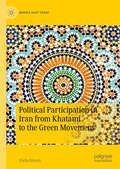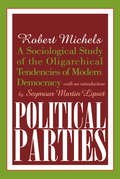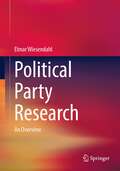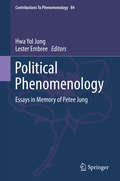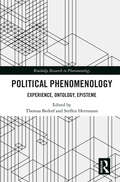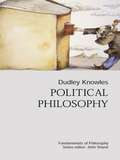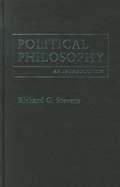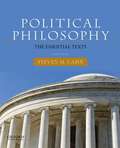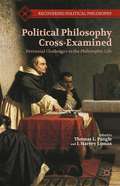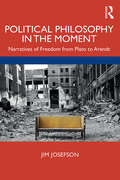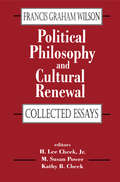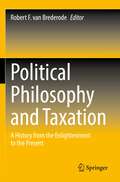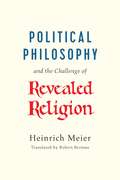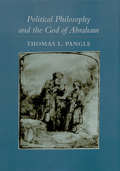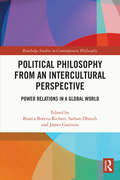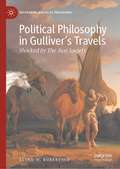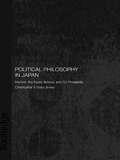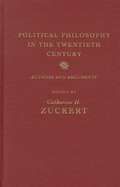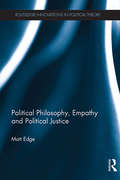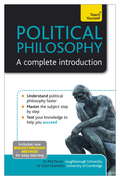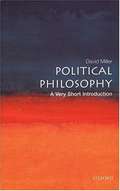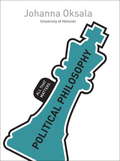- Table View
- List View
Political Participation in Iran from Khatami to the Green Movement (Middle East Today)
by Paola RivettiThis book examines the unintended consequences of top-down reforms in Iran, analysing how the Iranian reformist governments (1997–2005) sought to utilise gradual reforms to control independent activism, and how citizens responded to such a disciplinary action. While the governments successfully ‘set the field’ of permitted political participation, part of the civil society that took shape was unexpectedly independent. Despite being a minority, independent activists were not marginal: without them, in fact, the Green Movement of 2009 would not have taken shape. Building on in-depth empirical analysis, the author explains how autonomous activism forms and survives in a semi-authoritarian country. The book contributes to the debate about the implications of elite-led reforms for social reproduction, offering an innovative interpretation and an original analysis of social movements from a political science perspective.
Political Parties: A Sociological Study of the Oligarchical Tendencies of Modern Democracy
by Robert MichelsThe principle of self-government through political parties, the cornerstone of democracy, has come to be regarded as a solution to the problem of nationality. This is because the principle of nationality entails the acceptance of the idea of popular government. The importance of the principle of nationality is undeniable, and most of the national questions of Western Europe might be solved in accordance with this principle. Matters are complicated by geographical and strategical considerations, such as the difficulty of determining natural frontiers and the frequent need to establish strategic frontiers. Moreover, the principle of nationality cannot help us where nationalities barely exist or where they are entangled in inextricable confusion.The present work is a critical discussion of the problem of democracy. Michels believes that democracy, as an intellectual theory and as a practical movement, has entered upon a critical phase from which exit will be extremely difficult. In this book he analyzes the tendencies that oppose the realization of democracy, and claims that these tendencies can be classified in three ways: dependence upon the nature of the individual; dependence upon the nature of the political structure; and dependence upon the nature of organization.This edition, described by Morris Janowitz as a "classic of modern social science" and by Melvin Tumin as "the beginning of a tradition," offers a landmark study in political science. Following its original publication in 1910, the study and analysis of political parties was established as a new branch of science. Political Parties continues to be a foundation work in the literature and is a necessary addition to the libraries of contemporary political scientists, sociologists, and historians.
Political Party Research: An Overview
by Elmar WiesendahlThe book by the well-known German party researcher Elmar Wiesendahl presents the development, theoretical perspectives, research approaches, and fields of investigation in party research in light of the state of the art.
Political Phenomenology
by Lester Embree Hwa Yol JungThis volume presents political phenomenology as a new specialty in western philosophical and political thought that is post-classical, post-Machiavellian, and post-behavioral. It draws on history and sets the agenda for future explorations of political issues. It discloses crossroads between ethics and politics and explores border-crossing issues. All the essays in this volume challenge existing ideas of politics significantly. As such they open new ways for further explorations BY future generations of phenomenologists and non-phenomenologists alike. Moreover, the comprehensive chronological bibliography is unprecedented and provides not only an excellent picture of what phenomenologists have already done but also a guide for the future.
Political Phenomenology: Experience, Ontology, Episteme (Routledge Research in Phenomenology)
by Thomas Bedorf Steffen HerrmannIn recent years phenomenology has become a resource for reflecting on political questions. While much of this discussion has primarily focused on the ways in which phenomenology can help reformulate central concepts in political theory, the chapters in this volume ask in a methodological and systematic way how phenomenology can connect first-person experience with normative principles in political philosophy. The chapters are divided into three thematic sections. Part I covers the phenomenology of political experience. The chapters in this section focus on a variety of experiences that we come across in political practice. The chapters in Part II address the phenomenology of political ontology by examining the constitution of the realm of the political. Finally, Part III analyzes the phenomenology of political episteme in which our political world is grounded. Political Phenomenology will be of interest to researchers working on phenomenology, Continental philosophy, and political theory.
Political Philosophy
by Dudley KnowlesThis comprehensive introduction to the major thinkers and topics in political philosophy explores the philosophical traditions which continue to inform our political judgements.Dudley Knowles introduces the ideas of key political thinkers including Hobbes, Locke, Marx and Mill and influential contemporary thinkers such as Berlin, Rawls and Nozick. He outlines central problems in political philosophy and encourages the reader to critically engage with all the issues discussed.The individual chapters discuss and analyse:* utilitarianism* liberty* rights* justice* obligation* democracyPolitical Philosophy is ideally suited to students taking introductory courses in political theory and philosophy.
Political Philosophy
by Richard G. StevensThis book by Richard G. Stevens is a comprehensive introduction to the nature of political philosophy. It offers definitions of philosophy and politics, showing the tension between the two and the origin of political philosophy as a means of resolution of that tension. Plato and Aristotle are examined in order to see the search for the best political order. Inquiry is then made into political philosophy's new tension brought about by the growth of revealed religion in the Middle Ages. It then examines the changes introduced by modernity and gives an overview of postmodern political thought. The book covers the most influential philosophers and directs readers to the classics of political philosophy, guiding them in studying them. It is an approachable introduction to a complex subject, not just a history of it. It is a point of entry into the subject for students and for others as well.
Political Philosophy
by Ronald BeinerHannah Arendt's last philosophical work was an intended three-part project entitled The Life of the Mind. Unfortunately, Arendt lived to complete only the first two parts, Thinking and Willing. Of the third, Judging, only the title page, with epigraphs from Cato and Goethe, was found after her death. As the titles suggest, Arendt conceived of her work as roughly parallel to the three Critiques of Immanuel Kant. In fact, while she began work on The Life of the Mind, Arendt lectured on "Kant's Political Philosophy," using the Critique of Judgment as her main text. The present volume brings Arendt's notes for these lectures together with other of her texts on the topic of judging and provides important clues to the likely direction of Arendt's thinking in this area.
Political Philosophy (3rd Edition): The Essential Texts
by Steven M. CahnPolitical Philosophy: The Essential Texts is ideal for survey courses in political philosophy. Offering wide coverage from antiquity to the present, this historically organized collection presents the most significant works from nearly 2,500 years of political philosophy.
Political Philosophy After 1945
by Alan HaworthBy the mid-twentieth century interest in political philosophy had dwindled, with one writer even pronouncing the subject ‘dead’. Things were to change in 1971, when the subject experienced a renaissance with the publication of John Rawls’s A Theory of Justice. The story didn’t end with Rawls however, as other avenues through which to approach the subject became available. In Political Philosophy After 1945 Alan Haworth tells the story of political philosophy from the mid-twentieth century to the early twenty-first. First, he considers why the subject should have become marginalised by mainstream philosophical movements such as logical positivism and the ‘ordinary language philosophy’ inspired by Wittgenstein. Subsequent chapters explain the fundamentals of Rawls’s theory, and then compare and contrast his contribution with that of other philosophers from across the political spectrum. These are followed by chapters in which alternative approaches are examined. There are in-depth accounts of works by Hannah Arendt and Alasdair MacIntyre, as well as an evaluation of the claim that political philosophy exemplifies the pursuit of a moribund ‘Enlightenment project’. Throughout the book, Haworth strikes a balance between historical perspective and close analysis of major texts, and he is careful to emphasise the relevance of theoretical issues to questions which arise beyond theory. As such, Political Philosophy After 1945 is essential reading for students and scholars of political philosophy, but also serves as an introduction for students from across the Humanities and Social Sciences approaching the topic for the first time.
Political Philosophy Cross-examined
by Thomas L. Pangle J. Harvey LomaxPolitical societies frequently regard philosophers as potential threats to morality and religion, and those who speak for politics often demand a defense of philosophy. This book will address philosophy as a mode of existence put into question.
Political Philosophy In the Moment: Narratives of Freedom from Plato to Arendt
by Jim JosefsonPolitical Philosophy In the Moment uncovers the political power of narrative by both telling and explaining the stories that frame our ability to be "in the moment." In a series of eleven short stories, Jim Josefson presents the history of political philosophy and Hannah Arendt’s alternative, an aesthetic form of politics. In the early stories, Josefson recounts how the four main traditions of political philosophy (Platonism, Aristotelianism, liberalism and historicism) promise truth but deny us the freedom available in reality. Then, he reviews the alternative narratives offered by thinkers like Kierkegaard, Nietzsche and Heidegger, which influenced Arendt’s view. The final chapters chart Arendt’s route back to the Moment, the freedom to read and tell a fuller story about the beauty and horrors that appear in the world. A page-turning book of short stories and a tour through the greatest works of political philosophy, Political Philosophy In the Moment is as approachable, comprehensible and welcoming as a fairy-tale, ideally suited for students of contemporary political theory and anyone interested in political thought.
Political Philosophy and Cultural Renewal: Collected Essays of Francis Graham Wilson (Library Of Conservative Thought Ser.)
by Francis WilsonFrancis Graham Wilson was a central figure in the revival of interest in political philosophy and American political thought in the mid-twentieth century. While he is best known as a Catholic writer and conservative theorist, his most significant contribution is his original interpretation of the development of American politics. Central to his thought was a process of self-interpretation by the citizenry, a quest for ultimate meaning turning to a divine, transcendent, basis of history and shared experience. Although Wilson's writings were extensive and influential, they have not been readily available for decades.
Political Philosophy and Taxation: A History from the Enlightenment to the Present
by Robert F. van BrederodeThis book explores how taxation is related to the role of the state and its relationship with its constituents, the concept of private property rights, the concepts of societal fairness and justice, and the battle between the individual and the collective. This book appeals to students and scholars who want to know how philosophers in the past and present think about taxation, and how their thinking has developed through cross-influencing. There exists no comprehensive study providing such an overview. This book is a foundational study on the philosophical justification of taxation (qualitative aspect) and the normative qualifications required of tax law to constitute tax that is just and fair (distributive or quantitative aspect). The latter includes evaluation of what type of tax is morally correct or acceptable to realize distributive justice. This book covers periods from the Enlightenment era until the present. The philosophers are grouped together in schools of thought and each chapter except for chapter 1 and chapter 13, are is dedicated to a specific philosophical school. Moreover, this book aims to provide an overview of each school of thinking and the individual philosophers, including placing them in the context of their times. The book has particular importance as the study of taxation is an underdeveloped area of political and legal philosophy.
Political Philosophy and the Challenge of Revealed Religion
by Heinrich Meier Robert BermanHeinrich Meier’s guiding insight in Political Philosophy and the Challenge of Revealed Religion is that philosophy must prove its right and its necessity in the face of the claim to truth and demand obedience of its most powerful opponent, revealed religion. Philosophy must rationally justify and politically defend its free and unreserved questioning, and, in doing so, turns decisively to political philosophy. In the first of three chapters, Meier determines four intertwined moments constituting the concept of political philosophy as an articulated and internally dynamic whole. The following two chapters develop the concept through the interpretation of two masterpieces of political philosophy that have occupied Meier’s attention for more than thirty years: Leo Strauss’s Thoughts on Machiavelli and Jean-Jacques Rousseau’s Social Contract. Meier provides a detailed investigation of Thoughts on Machiavelli, with an appendix containing Strauss’s original manuscript headings for each of his paragraphs. Linking the problem of Socrates (the origin of political philosophy) with the problem of Machiavelli (the beginning of modern political philosophy), while placing between them the political and theological claims opposed to philosophy, Strauss’s most complex and controversial book proves to be, as Meier shows, the most astonishing treatise on the challenge of revealed religion. The final chapter, which offers a new interpretation of the Social Contract, demonstrates that Rousseau’s most famous work can be adequately understood only as a coherent political-philosophic response to theocracy in all its forms.
Political Philosophy and the God of Abraham
by Thomas L. PangleIn this book noted scholar Thomas L. Pangle brings back a lost and crucial dimension of political theory: the mutually illuminating encounter between skeptically rationalist political philosophy and faith-based political theology guided ultimately by the authority of the Bible. Focusing on the chapters of Genesis in which the foundation of the Bible is laid, Pangle provides an interpretive reading illuminated by the questions and concerns of the Socratic tradition and its medieval heirs in the Christian, Jewish, and Islamic worlds. He brings into contrast the rival interpretive framework set by the biblical criticism of the modern rationalists Hobbes and Spinoza, along with their heirs from Locke to Hegel. The full meaning of these diverse philosophic responses to the Bible is clarified through a dialogue with hermeneutic discussions by leading political theologians in the Judaic, Muslim, and Christian traditions, from Josephus and Augustine to our day. Profound and subtle in its argument, this book will be of interest not only to students and scholars of politics, philosophy, and religion but also to thoughtful readers in every walk of life who seek to deepen their understanding of the perplexing relationship between religious faith and philosophic reason.
Political Philosophy from an Intercultural Perspective: Power Relations in a Global World (Routledge Studies in Contemporary Philosophy)
by Sarhan Dhouib James Garrison Bianca Boteva-RichterThe objective of the following collected volume is to encourage a critical reflection on the relationship between "power" and "non-power" in our contemporary "world" and, proceeding from various philosophical traditions, to investigate the multifaceted aspects of this relationship. The authors’ respective investigations proceed from an intercultural perspective and fall predominantly in the domain of political theory and philosophy. This volume takes an intercultural political perspective, which means, on the one hand, involving non-European philosophies in a global debate about power relations and their effects in the world and, on the other hand, confronting local traditions of thought with a global inquiry in order to enter into a philosophical-political dialogue with these traditions. An intercultural approach of this type to political philosophy seeks not only to join others in reflecting upon global problems, but also to decenter of our understanding of the world, drawing attention to new ways of thinking. Insofar as the authors of the planned volume deal with "concrete" philosophical-political problems unfolding in various regions of the world, they seek to shed light on burning issues like migration, human rights violations, dictatorship and language, global poverty, power asymmetries, experiences of injustice with the further goal of offering a particularly intercultural analysis of these problems along with approaches to resolving them. To date, there is no book that collects various essays from different countries and perspectives and poses political-philosophical problems from an intercultural point of view.
Political Philosophy in Gulliver’s Travels: Shocked by The Just Society (Recovering Political Philosophy)
by Lloyd W. RobertsonThis book analyzes Jonathan Swift’s Gulliver’s Travels from a political philosophy perspective. When authors have focused on politics in Swift’s writings, this has usually meant a study of how Swift located himself on issues of his day such as church and state, and Ireland. Robertson claims by contrast that Gulliver’s Travels is fundamentally a book about the “ancients” (e.g. Plato, Aristotle), and the “moderns” (science and technology), and their contrasting views about the human condition. The claim that the Travels is “a kind of prolegomena” to political philosophy leaves open the possibility that it does not achieve, or seek to achieve, a fusion of various teachings but rather uses the device of alien societies to point us to uncomfortable aspects of political philosophy’s “larger questions” we are prone to ignore. Swift, Robertson argues, draws our attention to some version of the classical republic, as idealized in Aristotle’s political writings and in Plato’s Republic, as opposed to a modern regime which, at its best or most intellectual, emphasizes modern science and technology in combination as a way to improve the human condition.
Political Philosophy in Japan: Nishida, the Kyoto School and co-prosperity (Routledge/Leiden Series in Modern East Asian Politics, History and Media)
by Christopher Goto-JonesPolitical Philosophy in Japan focuses on the politics of Japan's pre-eminent philosophical school - the Kyoto School - and particularly that of its founder, Nishida Kitarô (1870-1945). Existing literature on Nishida is dismissive of there being serious political content in his work, and of the political stance of the wider school. Goto-Jones contends that, far from being apolitical, Nishida's philosophy was explicitly and intentionally political, and that a proper political reading of Nishida sheds new light on the controversies surrounding the alleged complicity of the Kyoto School in Japanese ultra-nationalism. This book offers a unique and potentially controversial view of the subject of Nishida and the Kyoto School.
Political Philosophy in the Twentieth Century
by Catherine ZuckertThis book demonstrates the rich diversity and depth of political philosophy in the twentieth century. Catherine H. Zuckert has compiled a collection of essays recounting the lives of political theorists, connecting each biography with the theorist's life work and explaining the significance of the contribution to modern political thought. The essays are organized to highlight the major political alternatives and approaches. Beginning with essays on John Dewey, Carl Schmitt and Antonio Gramsci, representing the three main political alternatives - liberal, fascist and communist - at mid-century, the book proceeds to consider the lives and works of émigrés such as Hannah Arendt, Eric Voegelin, and Leo Strauss, who brought a continental perspective to the United States after World War II. The second half of the collection contains essays on recent defenders of liberalism, such as Friedrich Hayek, Isaiah Berlin and John Rawls and liberalism's many critics, including Michel Foucault, Jürgen Habermas and Alasdair MacIntyre.
Political Philosophy versus History?
by Jonathan Floyd Marc StearsIs the way in which political philosophy is conducted today too ahistorical? Does such ahistoricism render political philosophy too abstract? Is political philosophy thus incapable of dealing with the realities of political life? This volume brings together some of the world's leading political philosophers to address these crucial questions. The contributors focus especially on political philosophy's pretensions to universality and on its strained relationship with the world of real politics. Some chapters argue that political philosophers should not be cowed by the accusations levied against them from outside of their own field. Others insist that these accusations require a dramatic reshaping of normative political thought. The volume will spark controversy across political philosophy and beyond.
Political Philosophy, Empathy and Political Justice (Routledge Innovations in Political Theory)
by Matt EdgeIn this work, Matt Edge offers an innovative approach to political philosophy. He invites the reader to consider the question of political justice from an empathic perspective - if you were asked to construct a theory of justice acceptable to members of a community you were not yourself a part of, how would you succeed in making your proposal acceptable? What tools would you rely on to construct such a theory, and why? Equally, what would make anyone qualified to write such a theory? Using empathy, this remarkable, natural, tool human beings possess for making moral and ethical decisions, and, thereby, placing yourself as someone on the receiving end of the very theory of justice you yourself are constructing, what would you come up with? What set of alterable human structures and systems would you deem acceptable, were you to find yourself in the position of a citizen living under such structures? Political Philosophy, Empathy and Political Justice offers a unique and compelling account of the type of free system required to pass an empathic examination at the heart of these, and related, questions, matters which define all human eras, in the constant search for political and social justice on our diverse planet.
Political Philosophy: A Complete Introduction: Teach Yourself
by Phil Parvin Clare ChambersWritten by Phil Parvin and Clare Chambers, who are current political philosophy lecturers and leading researchers, Political Philosophy - The Essentials is designed to give you everything you need to succeed, all in one place. It covers the key areas that students are expected to be confident in, outlining the basics in clear jargon-free English, and then providing added-value features like summaries of key thinkers, and even lists of questions you might be asked in your seminar or exam. The book's structure follows that of most university courses on political philosophy, by looking at the essential concepts within political philosophy (freedom, equality, power, democracy, rights, the state, political obligation), and then looking at the ways in which piolitical philosophers have used these fundamental concepts in order to tackle a range of normative political questions such as whether the state has a responsibility to alleviate inequalities, and what interest liberal and demovratic states should take in the cultural or religious beliefs of citizens. Teach Yourself titles employ the 'Breakthrough method', which is designed specifically to overcome problems that students face. - Problem: 'I find it difficult to remember what I've read.'; Solution: this book includes end-of-chapter questions and summaries, - Problem: 'Most books mention important other sources, but I can never find them in time.'; Solution: this book includes key texts and case studies are summarised, complete with fully referenced quotes ready to use in your essay or exam. - Problem: 'Lots of introductory books turn out to cover totally different topics than my course.'; Solution: this book is written by a current university lecturer who understands what students are expected to know.
Political Philosophy: A Very Short Introduction
by David MillerThis book introduces readers to the key concepts of political philosophy: authority, democracy, freedom and its limits, justice, feminism, multiculturalism, and nationality. Accessibly written and assuming no previous knowledge of the subject, it encourages the reader to think clearly and critically about the leading political questions of our time. Miller first investigates how political philosophy tackles basic ethical questions such as 'how should we live together in society?' He furthermore looks at political authority, discusses the reasons society needs politics in the first place, explores the limitations of politics, and asks if there are areas of life that shouldn't be governed by politics. Moreover, he explores the connections between political authority and justice, a constant theme in political philosophy, and the ways in which social justice can be used to regulate rather than destroy a market economy. In his travels through this realm, Miller covers why nations are the natural units of government and wonders if the rise of multiculturalism and transnational co-operation will change all this, and asks in the end if we will ever see the formation of a world government.
Political Philosophy: All That Matters
by Johanna OksalaWhat is political philosophy? A philosophical study of political ideas such as authority, freedom, justice and democracy? An inquiry into the best form of government? An attempt to rationally justify forms of authority? Johanna Oksana asks exactly these questions as she opens this brilliant new guide to political philosophy. Rather than attempting to provide the reader with a definite answer, the book invites readers to recognize many of the issues encountered in everyday life as political, the outcome of human practices that incorporate power relations, social norms and obligations. It suggests that political philosophy should be understood as an open-ended, critical project that to some extent concerns everyone. The book employs an original structure which will be a huge help to both students and general readers seeking to understand the topic. Each chapter, which moves chronologically from antiquity to the twentieth century, focuses on selected classic texts in political philosophy, which are briefly introduced and analysed. The texts then function as a springboard for a discussion of central contemporary issues in political philosophy.
